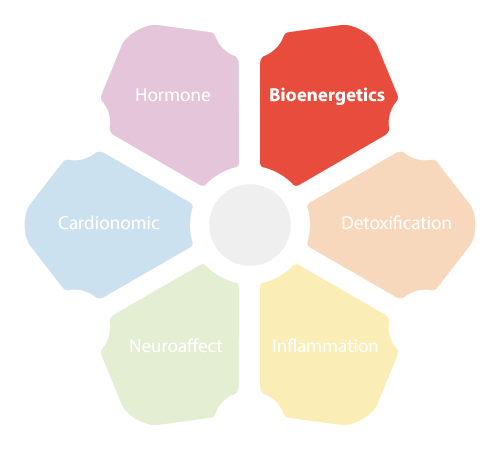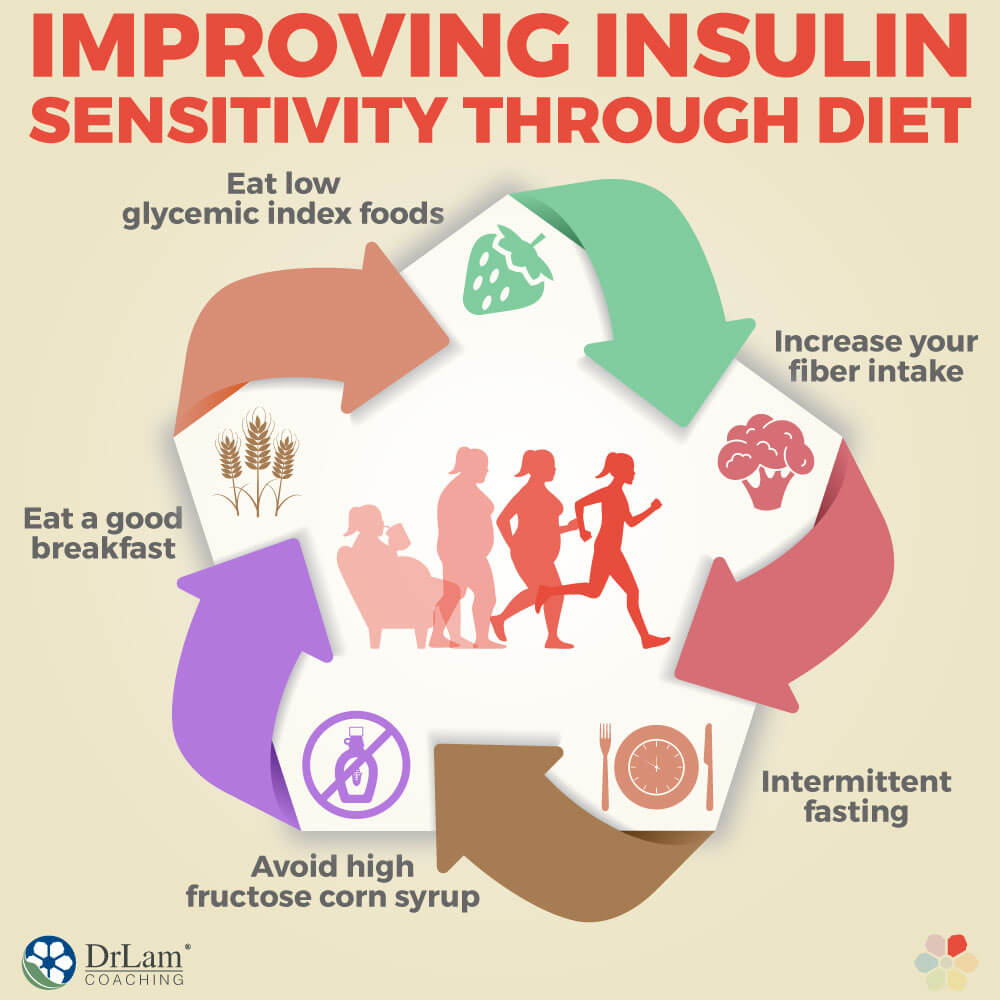Insulin resistance is a very common problem in modern society and it’s also a very serious one that’s connected to specific disorders and diseases as well as general ill health. People who are insulin resistant often find themselves fighting diseases like diabetes and cardiovascular disease as well as excess weight and lack of energy. That’s why insulin resistance is such a serious sign of present and future problems and should be addressed as soon as possible. This is even more important if you have adrenal fatigue, which is caused by high stress levels. Stress is often a big factor in reducing insulin sensitivity and developing type II diabetes. But if you do want to reverse this problem, there are dietary and lifestyle changes that will go a long way to making this happen.
 One in three Americans and half of people over the age of 60 have insulin resistance. This is a shocking statistic because it’s a very serious problem that’s linked to long-term health risks. When you have insulin resistance, the cells in your body start resisting the signals sent out by insulin. Insulin is designed to tell the body’s cells to grab glucose from the blood. Glucose is the body’s primary source of fuel and energy and is derived from foods that break down into carbohydrates. So when cells start resisting this command, it causes problems in every cell and organ in your body.
One in three Americans and half of people over the age of 60 have insulin resistance. This is a shocking statistic because it’s a very serious problem that’s linked to long-term health risks. When you have insulin resistance, the cells in your body start resisting the signals sent out by insulin. Insulin is designed to tell the body’s cells to grab glucose from the blood. Glucose is the body’s primary source of fuel and energy and is derived from foods that break down into carbohydrates. So when cells start resisting this command, it causes problems in every cell and organ in your body.
When your cells become insulin resistant, it causes the body to produce more insulin. Over the years, the pancreatic cells that produce insulin become fatigued through overwork and can’t keep up with the ever-increasing demand for insulin. They start to fall behind with their work, which means that your blood sugar levels will start to rise even as your energy levels fall. This will also make you more prone to other problems such as weight gain, memory disruptions and heart disease that can threaten your quality of life and even your mortality.
Often there are no symptoms when you become resistant to insulin, which is why it’s so dangerous and so widespread. Many people simply don’t know that they suffer from the issue. But there are usually subtle signs of it, even if they aren’t obviously connected to insulin resistance. If you think you may have this issue, here’s what you need to look out for:
If you experience some or all of these symptoms and your doctor can’t work out what’s going on, it’s worth talking to them about insulin resistance.
Several different factors can increase your risk of developing insulin resistance including:
Insulin resistance is also often seen in people who have what’s known as metabolic syndrome. This is a cluster of conditions that includes excess weight, high blood pressure, and high cholesterol levels, and it can increase your risk of cardiovascular disease and Type II diabetes. Stress is an especially common cause of physical problems that can lead to insulin resistance.
 Stress is a key cause of insulin resistance. The modern world is filled with sources of chronic, ongoing stress such as work, relationships, poor diets, environmental toxins, and lifestyles that are too sedentary to be healthy. Chronic stress is a serious problem that the body just isn’t designed to cope with. The human body addresses stress through the NeuroEndoMetabolic (NEM) stress response. This is the body’s defense against stress and the system that controls the changes that occur in the body because of stress. The adrenal glands are a big part of the NEM stress response because they excrete cortisol, the hormone that prompts all the other stress-related changes in the body.
Stress is a key cause of insulin resistance. The modern world is filled with sources of chronic, ongoing stress such as work, relationships, poor diets, environmental toxins, and lifestyles that are too sedentary to be healthy. Chronic stress is a serious problem that the body just isn’t designed to cope with. The human body addresses stress through the NeuroEndoMetabolic (NEM) stress response. This is the body’s defense against stress and the system that controls the changes that occur in the body because of stress. The adrenal glands are a big part of the NEM stress response because they excrete cortisol, the hormone that prompts all the other stress-related changes in the body.
But when stress becomes chronic, the NEM stress response has to be active constantly, and this is not how the system is designed to work. This constant demand causes the adrenal glands to become fatigued and start to struggle with the demand for cortisol. Even early on, when the adrenals are struggling but still keeping up with the demand for cortisol, this causes widespread problems throughout the body. Cortisol affects every circuit in the body, so it’s inevitable that these problems start to appear. But if the adrenals start to fall behind with their duties, the problems and imbalances in the body can become life-threatening. This can ultimately result in Adrenal Fatigue Syndrome (AFS).
People who have AFS often experience fluctuations in their blood sugar levels that could be linked to insulin resistance. However, the connection between AFS and insulin resistance is often caused by imbalances in the Bioenergetics circuit, which controls how your body distributes energy.
There are six circuits in the NEM model of the human body, each of them comprised of three organs or systems. The Bioenergetics circuit contains the pancreas, liver, and thyroid, and these three organs work together and separately to provide energy to the body. They each perform a multitude of cell processes to convert food into energy so that individual cells can keep functioning. This is obviously a very important role in the body, which is why malfunctions in this circuit can be so devastating. The liver also has additional duties in helping rid the body of toxins and regulating inflammatory responses.
When the Bioenergetics circuit is healthy, it supplies the cells and the body with a steady flow of energy that’s necessary for its optimum functioning. It also helps to decrease the build-up of metabolites in the body and protects against the ravages of stress. However, when this circuit becomes unbalanced through AFS, the associated problems can be numerous and widespread. These can include brain fog or diminished cognitive function due to inadequate blood glucose supplies to the brain, low energy levels overall because of low nutrient supplies to cells, increased toxicity in the body, and slower than normal stress recovery.
One of the first symptoms that appears when the Bioenergetics circuit malfunctions is sugar cravings as your body tries to make up for dropping energy levels. This is an easily overlooked symptom that can result in excessive snacking and an increased workload for the pancreas.
The pancreas produces enzymes, that help with digestion, and insulin, which regulates blood sugar levels. When you’re insulin resistant on top of AFS, this organ becomes even more severely overworked as it tries to produce enough insulin to overcome the insulin resistance and ensure adequate nutrient uptake. And because of the interconnected nature of the organs in the Bioenergetics circuit, this will cause the others to malfunction as well.
 A healthy diet is absolutely essential when you have insulin resistance. In fact, it may be the most effective way for you to increase your insulin sensitivity and avoid all the associated health problems. A low glycemic index (GI) diet has been shown to lead to better blood sugar control as well as a whole host of health benefits. A low GI diet is based on how foods affect your blood sugar levels. Foods containing carbohydrates, which can be broken down into glucose, are given a number according to how much they increase your blood sugar levels. A low GI diet is based on the foods that cause smaller increases in blood sugar levels. This is important because frequent and severe fluctuations in blood sugar levels can bring on insulin resistance. Some of the foods that are considered low GI are:
A healthy diet is absolutely essential when you have insulin resistance. In fact, it may be the most effective way for you to increase your insulin sensitivity and avoid all the associated health problems. A low glycemic index (GI) diet has been shown to lead to better blood sugar control as well as a whole host of health benefits. A low GI diet is based on how foods affect your blood sugar levels. Foods containing carbohydrates, which can be broken down into glucose, are given a number according to how much they increase your blood sugar levels. A low GI diet is based on the foods that cause smaller increases in blood sugar levels. This is important because frequent and severe fluctuations in blood sugar levels can bring on insulin resistance. Some of the foods that are considered low GI are:
Foods that are low GI are mostly unprocessed. For example, instant oatmeal is not low GI. It’s so processed that the grains break down too small and affect your blood sugar levels too much. But steel-cut oatmeal is mostly unprocessed and breaks down slower, which is why it’s considered a low GI food. There is no relationship between how many carbohydrates there are in a food and its GI rating. Also, healthy fats and proteins in a carbohydrate food have the effect of making it harder and slower to process and lowering the GI rating. That’s why foods like avocado and other healthy fats are so good for your body. Avocado contains a combination of different types of fats, which is essential for diabetes care.
Low GI foods don’t cause big fluctuations in blood sugar levels, which is why they’re considered better for your blood sugar levels and beneficial for reversing insulin resistance. This means that your pancreas doesn’t have to work as hard to ensure that every cell in your body gets the energy it needs to function properly, and it can start to heal.

Just changing to a low GI diet isn’t enough if you want to decrease insulin resistance. There are also several other changes that you need to make, including:
 Intermittent fasting. Intermittent fasting can be very beneficial for insulin regulation and weight loss. There are several different fasting patterns including the 5:2 diet where you eat normal amounts of healthy food for 5 days and then restrict your calories for 2 days. Other diets allow you to eat normally, but only eat during an 8 or 10-hour window each day. Intermittent fasting also has the added benefit of improving gut health, which is essential for diabetes management as well as weight loss. However, those with AFS might not be able to fast for long periods and might have to eat often.
Intermittent fasting. Intermittent fasting can be very beneficial for insulin regulation and weight loss. There are several different fasting patterns including the 5:2 diet where you eat normal amounts of healthy food for 5 days and then restrict your calories for 2 days. Other diets allow you to eat normally, but only eat during an 8 or 10-hour window each day. Intermittent fasting also has the added benefit of improving gut health, which is essential for diabetes management as well as weight loss. However, those with AFS might not be able to fast for long periods and might have to eat often.Making these changes to your eating plans is a big step toward nourishing your body and stabilizing your blood sugar levels. Over time, eating in this way has helped many people to decrease insulin resistance, and many other conditions as well.

A low glycemic index diet will do more than decrease insulin resistance. It supports overall health, and it may also help improve adrenal fatigue. Here are some of the potential benefits of this way of eating:
 Improved gut health. Your gut health is essential to the health of your entire body and to the functioning of the Bioenergetics circuit. Effective and efficient digestion is essential for ensuring that the Bioenergetics circuit has everything it needs to supply the body’s cells with the substances they need for energy. This is what your gut microbiome specializes in, and it’s one reason a healthy gut is so important. This may help to alleviate fatigue and brain fog as well as other symptoms associated with low energy levels. It will also help to reduce insulin resistance and blood sugar instabilities, two potential and common causes of stress for people with AFS.
Improved gut health. Your gut health is essential to the health of your entire body and to the functioning of the Bioenergetics circuit. Effective and efficient digestion is essential for ensuring that the Bioenergetics circuit has everything it needs to supply the body’s cells with the substances they need for energy. This is what your gut microbiome specializes in, and it’s one reason a healthy gut is so important. This may help to alleviate fatigue and brain fog as well as other symptoms associated with low energy levels. It will also help to reduce insulin resistance and blood sugar instabilities, two potential and common causes of stress for people with AFS.Making the change to a low GI diet is very beneficial in reversing insulin resistance. And you can intensify these good effects by adding some exercise to your daily routine.
What you eat is probably the most important factor in your blood sugar levels and insulin resistance. But exercise is important as well. A lack of physical exercise is closely linked to the lowering of insulin sensitivity and the development of diabetes. The exact mechanics of this connection aren’t fully understood at the moment, though it may have to do with a decline in vascular health and function. This means that physical inactivity causes your veins, arteries, and capillaries to become less efficient in transporting blood and other substances throughout your body. But fixing this is simple. According to most sources, all you need is 4 hours of exercise every week where your pulse is doubled.
Mild exercise can be very helpful when you suffer from AFS. Exercise has been shown to encourage the release of endorphins, which can lift your mood and improve your cognitive abilities. It can also boost your metabolism and encourage sweating, which will help with detox. This could help to alleviate symptoms and support the work of the Bioenergetics circuit by reducing the toxic build-up that’s overworking the liver, supporting better digestion, and improving energy levels. All of these benefits also support the overall health of your body and promote healing as well.
But you must be careful when adopting this strategy, as exercise can be a problem for people with AFS. AFS often causes exercise intolerances, particularly in the later stages. This means that if you have AFS, your body may react badly to even mild exercise. This can result in an adrenal crash as your body loses the battle to keep up with the new energy demands. Those with AFS should consult their primary doctor or find a specialist who understands their condition before starting strenuous exercises.
Sleep is an often-neglected part of your daily routine. When you’re busy or stressed it’s often the first thing to go. Yet good sleep is essential if you want to be and feel healthy. Poor sleeping patterns affect your mood, your ability to concentrate, your energy levels, and they also affect your body’s response to insulin. You should be getting at least six and a half hours of good quality sleep every night for good health, but this can be highly individual so you need to listen to what your body is telling you.
This connection between good quality sleep and insulin resistance is a problem for people who have AFS. Imbalances in the Bioenergetics circuit can often cause ongoing and persistent tiredness because as the organs struggle to meet the demands for energy. This will affect your mood and your mental health, which could impede your efforts to improve the quality of your sleep. If AFS or other conditions you have do interfere with your ability to get a good night’s sleep, you may want to take a more systematic approach.
When you have nutritional deficiencies or AFS, the best situation is to you improve your diet so you’re eating everything you need to be healthy. However, this isn’t always possible. There are a lot of nutrients that your body needs even when it’s healthy which can be difficult to consume in different foods. So you may need to supplement. Supplementing can be an easy way to bring your nutrient levels up to normal quickly and without spending all your money on food or having to eat enormous amounts of new foods that are unfamiliar to your body.
Supplementation can be very helpful for insulin resistance as well. There are several supplements that can increase insulin sensitivity or have other positive effects on blood sugar levels. Some of these are:

These supplements can all help reduce insulin resistance and improve overall health. Always ask your health practitioner before taking these supplements as those with AFS sometimes have paradoxical reactions when taking certain supplements, and your blood sugar levels should be monitored to ensure improvement. These last two supplements are also especially helpful for AFS.
Biotin, in particular, could be very helpful if you have AFS. This is a substance that’s made by the gut and is pivotal to gut health.
The balance of good and bad bacteria in your gut is pivotal for good digestion. And if your digestion isn’t functioning properly, then your energy levels will be low. It doesn’t matter how healthy the Bioenergetics circuit is, it can’t supply the cells with nutrients that it doesn’t have, which is why improving your digestion can only help with this task.
Your gut health is also pivotal in brain health. In fact, this connection is so strong that gut health has been implicated in several mental disorders including anxiety, depression, and brain fog. The gut is also essential for ensuring the brain’s supply of glucose, the brain’s preferred fuel, so if the gut is unable to do this, it can have a devastating effect on brain functions. Thus, supplementing with biotin could naturally support the Bioenergetics circuit and improve brain health.
Taurine is also an essential nutrient when you have AFS. This is an amino acid that is depleted through stress, so many people with AFS often have deficiencies in it. Taurine is an essential element in several metabolic processes, so supplementing with it when you have AFS could help with digestion and overall health.
It isn’t just man-made substances that can increase insulin sensitivity and decrease insulin resistance. There are also several botanicals, substances derived from plants, that can have this effect. Some botanicals that lower blood sugar and have other benefits in terms of blood sugar levels include:
By adding more of these botanicals into your diet, either through supplementation or simply by eating them daily, you may be able to decrease insulin resistance and improve your overall health at the same time. This may also help with AFS symptoms and imbalances by supplying your body with the essential nutrients it needs to function properly and correct deficiencies.
If you have AFS, then you need to be very careful when making any changes to your diet or taking new supplements or botanicals. People with AFS often experience sensitivities to medications or supplements or even paradoxical reactions. This is when you react badly to new foods or medications that are meant to improve your condition. Your body to react in the opposite way to what you’re hoping for.
To avoid these kinds of reactions, any changes you make need to occur under the care and supervision of a medical professional who’s aware of AFS and the effects it can have on your body. With this kind of assistance, you can make changes that are tailored to your body and the symptoms. And as with any changes you make, if you notice any adverse effects from any of these supplements or botanicals, stop taking them immediately and seek expert help.
 Insulin resistance is a growing problem in the modern world, and it shouldn’t be ignored. Research is ongoing into this disorder, but what is clear is that it can severely affect your quality of life and even threaten your mortality. Fortunately, you can manage and even reverse this problem with the right combination of diet and lifestyle changes. By making the change to a diet and exercise plan that improves the health of your body and supports its natural processes and healing, you can avoid the health threats associated with this disorder. This will also help you if you have AFS, aid in rebalancing your Bioenergetics circuit, and improve the health of your body overall.
Insulin resistance is a growing problem in the modern world, and it shouldn’t be ignored. Research is ongoing into this disorder, but what is clear is that it can severely affect your quality of life and even threaten your mortality. Fortunately, you can manage and even reverse this problem with the right combination of diet and lifestyle changes. By making the change to a diet and exercise plan that improves the health of your body and supports its natural processes and healing, you can avoid the health threats associated with this disorder. This will also help you if you have AFS, aid in rebalancing your Bioenergetics circuit, and improve the health of your body overall.
Having insulin resistance makes you more likely to develop type II diabetes, and it also puts you at risk of developing heart disease. Fortunately, this problem can be reversed by making some carefully designed and implemented diet and lifestyle changes.
